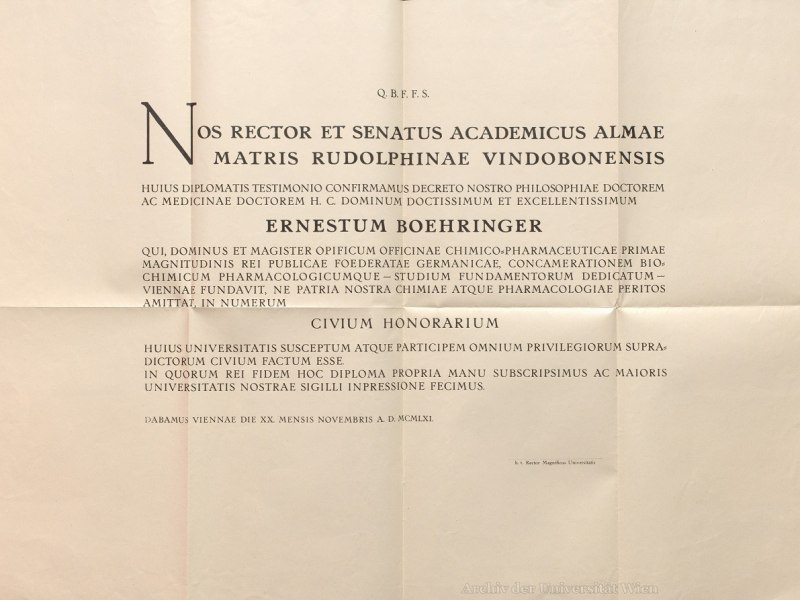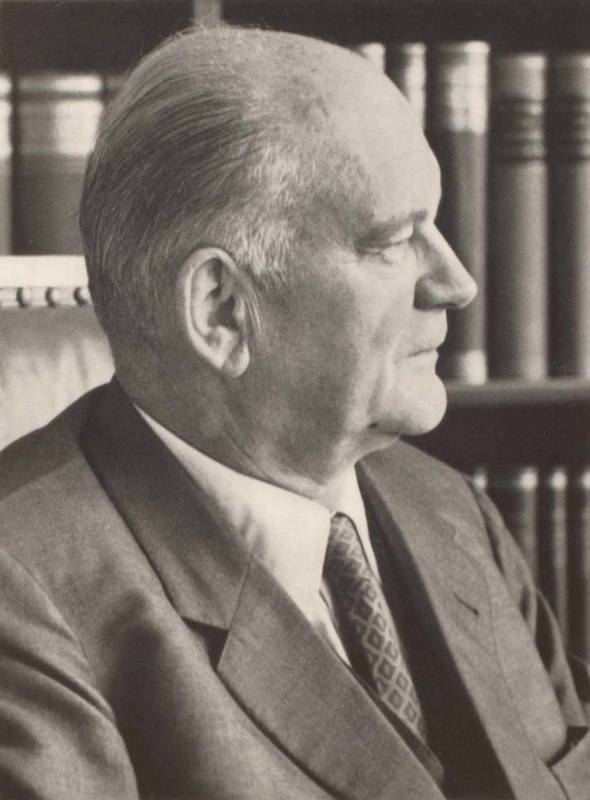Ernst Boehringer, Dr., Dr. h.c.
PhD chemist and industrialist, co-owner of "CH. Boehringer Sohn" (CHBS) (today: Boehringer Ingelheim), founder of a basic pharmaceutical research institute in Vienna in the 1960s, provided important incentives for the development of Vienna as a business location
Honors
| Ehrung | Titel | Datierung | Fakultät | |
|---|---|---|---|---|
| Honorary Citizen | civ.h.c. | 1961/62 | Faculty of Philosophy |
Ernst Boehringer, Inhaber des Pharmakonzerns C.H. Boehringer Sohn in Ingelheim, wurde am 5. Februar 1962 zum "Ehrenbürger der Universität Wien" ernannt, als Mann "… QUI, DOMINUS ET MAGISTER OPIFICUM OFFICINAE CHIMICO-PHARMACEUTICAE PRIMAE MAGNITUDINIS REI PUBLICAE FOEDERATAE GERMANICAE, CONCAMERATIONEM BIOCHIMICUM PHARMACOLOGICUMQUE – STUDIUM FUNDAMENTORUM DEDICATUM – VIENNAE FUNDAVIT, NE PATRIA NOSTRA CHIMIAE ATQUE PHARMACOLOGIAE PERITOS AMITTAT" (Wortlaut Diplom), der "als Besitzer und Leiter eines der größten chemischen und pharmazeutischen Unternehmen in der deutschen Bundesrepublik in Wien ein Forschungsinstitut für Biochemie und Pharmakologie gegründet hat, mit dem Zweck, der Grundlagenforschung zu dienen, und der es durch seine Tat ermöglicht hat, ausgebildete österreichische Kräfte auf beiden Gebieten ihrem Vaterlade zu erhalten" - das Institut wurde dann im November 1962 eröffnet in Wien 12., Laskegasse 5-9 (seit 1975: Dr. Boehringer Gasse 5-11) Ernst Boehringer, owner of the pharma group C.H. Boehringer Sohn in Ingelheim, was appointed "Honorary Citizen" of the University of Vienna on February 5, 1962 as a man "... QUI, DOMINUS ET MAGISTER OPIFICUM OFFICINAE CHIMICO-PHARMACEUTICAE PRIMAE MAGNITUDINIS REI PUBLICAE FOEDERATAE GERMANICAE, CONCAMERATIONEM BIOCHIMICUM PHARMACOLOGICUMQUE - STUDIUM FUNDAMENTORUM DEDICATUM - VIENNAE FUNDAVIT, NE PATRIA NOSTRA CHIMIAE ATQUE PHARMACOLOGIAE PERITOS AMITTAT" (wording diploma), who "as owner and director of one of the largest chemical and pharmaceutical companies in the German Federal Republic founded in Vienna a research institute for biochemistry and pharmacology, with the purpose of serving basic research, and who by his deed made it possible to preserve trained Austrian forces in both fields to their country" - the institute was then opened in November 1962 in Vienna's 12 district, Laskegasse 5-9 (since 1975: Dr. Boehringer Gasse 5-11). |
Ernst Boehringer was a member of the German nationalist and anti-democratic "Stahlhelm" and became a member of the "SA" in 1933, a member of the NSDAP from 1936, after the end of the Nazi regime he was denazified, acquitted of the exploitation of foreign workers under National Socialism, and in the course of the German economic miracle he expanded his company Boehringer Ingelheim into a global enterprise. In 1975, a street was also named after the much honored man in Vienna - the historical review of Viennese street names in 2013 also classified this naming under "great need for discussion".
- Pharmacy
- Pharmaceutical Chemistry
Ernst Boehringer was born on 1896 in Ingelheim, Germany and participated as a war volunteer in the First World War until a very protracted and painful wound of the left elbow joint.
He studied chemistry at the universities of Würzburg and Munich and finished his studies with a doctoral thesis in the field of alkaloid chemistry.
Since 1919 he was a partner in the family business "CH. Boehringer Sohn" (CHBS), an employee from 1927 and managing director from 1937 (together with his brother Albert Boehringer Jr. and his brother-in-law Julius Liebrecht). He joined his father's company in times of economic crisis and built up the development of pharmaceuticals, in addition to the production and research focus of organic acids and alkaloids at that time.
In 1930, Ernst Boehringer joined the German nationalist and anti-democratic "Stahlhelm," a right-wing conservative paramilitary organization of former front-line fighters that was absorbed into the SA, to which Boehringer thus belonged from 1933. He also became a member of the NSDAP on April 1, 1936 (membership number 3,775,002), even though this was not necessarily in line with his political convictions, as he distanced himself from otherwise customary addresses of allegiance from captains of industry to the "Führer" and he also repeatedly hired mainly Jewish persecutees in his companies or helped them to flee abroad. He also took part in World War II, fought in the Deutsche Wehrmacht in France and Russia, attained the rank of major and was promoted to SA-Obersturmführer in 1943 and shortly thereafter awarded the German Cross in Gold. On April 17, 1944, he was assigned to the "General Representative for Italy of the Reich Minister for Armaments and War Production."
After the end of the Nazi regime, he was denazified, he and the company management were cleared of the exploitation of foreign laborers in the Nazi regime, and he continued to expand his company Boehringer Ingelheim into a worldwide enterprise during the "Deutsche Wirtschaftswunder", whereby after an alternative operation in Leobersdorf during the Nazi period, after the end of World War II, Boehringer Ingelheimfounded the first foreign subsidiary in 1948 in Vienna: Bender & Co. GmbH. This was followed in 1962 by the establishment of the company's own basic research institute in Vienna. This was both an incentive for the development of Vienna as a business location and for the training and employment of chemists and pharmacists in Austria, who would otherwise have migrated abroad. This focus was further expanded by his successors, who made a significant contribution to the creation of the Campus Vienna Biocenter in the 1980s.
The foundation of the research institute in Faskegasse (today: Dr. Boehringer-Gasse) was one of the reasons that he was made an honorary citizen of the University of Vienna on February 5, 1962 for his services to pharmaceutical research in Vienna at the request of Prof. Franz Theodor Brücke and Prof. Hans Tuppy of the Medical Faculty. The motion stated:
"Ernst Boehringer, who is one of the most outstanding industrialists in West Germany in the field of medicinal products, will celebrate his 65th birthday in August of this year and last year began to build a very generous research institute here in Vienna, which is expressly intended to serve primarily basic research and whose biochemical department is to be scientifically directed by Prof. Tuppy, while the pharmacological department is to be supervised by a senior student of the Pharmacological Institute. The above-mentioned project is an undertaking which is undoubtedly of great importance for medical theoretical science in Vienna, especially since considerable endowments will be available to this institute."
He recognized early on the seminal importance of this branch of the chemical industry, which was still in its infancy at the time, and gained a recognized place in this new territory of chemical and biological research.
He was awarded the star of the Grand Cross of the Order of Merit of the Federal Republic of Germany, honorary citizenship of the city of Espalion in southern France, an honorary doctorate from the Medical Faculty of Mainz, the Philipps Plaque from the University of Marburg, honorary senatorship of the universities of Freiburg/Breisgau and Munich, honorary senatorship of the University of Tübingen, and honorary citizenship of the University of Vienna and the University of Frankfurt am Main during his lifetime.
On January 11, 1965, Ernst Boehringer died at the age of 69.
In Vienna, he was posthumously honored in January 1975 by the renaming of that part of Laskestrase, where the research laboratories were opened in 1962, as Dr. Boehringer-Gasse. In the historical review of Viennese street names, this naming was classified in 2013 under: "great need for discussion".
Zuletzt aktualisiert am 01/22/24
-

Honorary citizen diploma of Dr. Dr. h.c. Ernst Boehringer
Honorary citizen diploma of Dr. Dr.h.c. Ernst Boehringer

